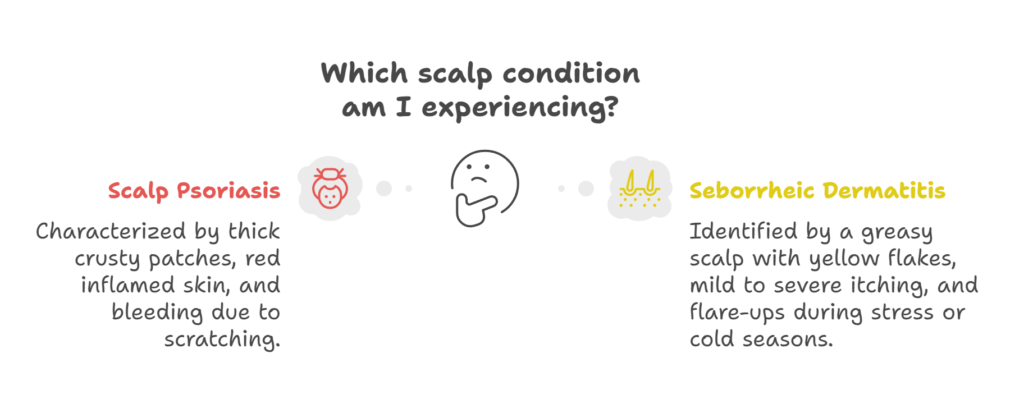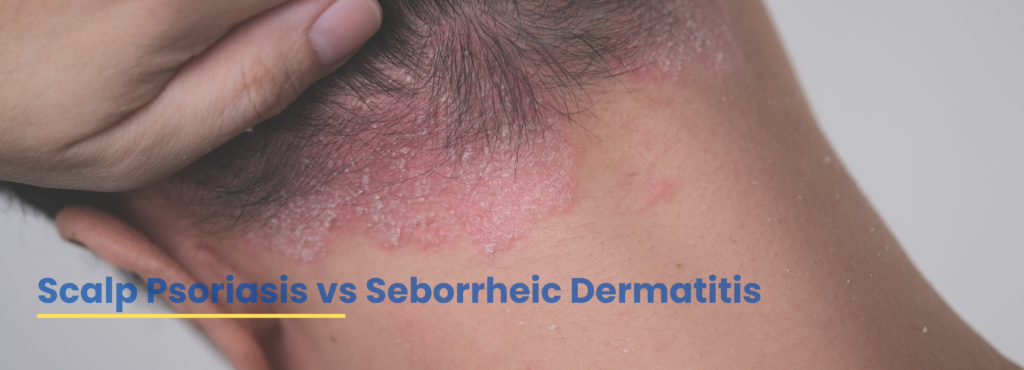If you’re experiencing itchy flakes, redness, or painful patches on your scalp, visiting a hair specialist for scalp conditions is your best first step.
A hair specialist for scalp conditions can help identify the real cause—be it dandruff, infection, or chronic skin issues. Whether it’s seasonal itching or long-term symptoms, a trusted hair specialist for scalp conditions plays a key role in correct diagnosis and treatment.
Scalp issues often start subtly—just a little dryness or a small patch of flakes. But over time, they can grow worse and impact your daily confidence, comfort, and even sleep.
Many people try home remedies for months without realizing they are treating the wrong problem. A hair specialist uses tools like dermoscopy and skin scraping to give you an accurate diagnosis, saving you time and discomfort.
Also, since scalp conditions often look alike but require different treatments, guessing can worsen your symptoms. The earlier you consult a hair specialist, the better your chances of avoiding complications like scalp infections, hair thinning, or chronic flare-ups.
Whether you’re dealing with weather-related scalp sensitivity or an autoimmune condition, expert help brings faster and safer relief.
What is Scalp Psoriasis?
Scalp psoriasis is a chronic autoimmune skin disease that causes a rapid buildup of skin cells. This leads to thick, crusty, silvery-white scales that are often itchy, red, and may extend beyond the hairline. It can be painful, and scratching may cause bleeding. It’s not contagious but often requires medical treatment.
What is Seborrheic Dermatitis?
Seborrheic dermatitis is a more common scalp condition that causes greasy, yellowish flakes and redness. It usually affects oily areas of the scalp and face. It’s believed to be caused by an overgrowth of yeast (Malassezia), and flare-ups are common during stress, hormonal changes, or cold weather.
Symptoms of Both Conditions

Understanding the symptoms can help you differentiate between the two conditions:
Scalp Psoriasis Symptoms:
Thick crusty patches that feel dry and tight
Red, inflamed skin often extending beyond the scalp
Bleeding when scratched
Burning or stinging sensation
Seborrheic Dermatitis Symptoms:
Oily, greasy yellow flakes that stick to the hair
Mild to intense itching
Swelling with Redness in oily areas like the scalp, face, or ears
Symptoms worsen in winter or under stress
Causes
Both conditions have different root causes:
Scalp Psoriasis Causes :
Overactive immune response: The body mistakenly attacks healthy skin cells, causing inflammation and rapid cell buildup.
Genetic or family history: People with a family history of psoriasis are more likely to develop the condition.
Certain medications or infections: Medicines like beta-blockers or infections like strep throat can trigger psoriasis flare-ups.
High levels of emotional stress: Stress is a major trigger that can worsen symptoms or bring on new patches.
Seborrheic Dermatitis Causes :
Overgrowth of Malassezia yeast on the scalp: This common yeast can irritate the skin and lead to flaking and redness.
Hormonal changes or imbalances: Fluctuations during puberty, menstruation, or menopause can increase susceptibility.
Excessive oil production: When your scalp makes too much oil, it can trap dirt and yeast, making the skin irritated and flaky.
Stress or seasonal changes, especially cold weather: These factors disrupt skin balance and worsen flare-ups.
How Can We Differentiate Them?
While they may look similar, scalp psoriasis and seborrheic dermatitis are different in appearance, severity, and treatment.
Scalp Psoriasis : This condition causes silvery-white scales that often form in patches and are thick. These patches may extend beyond the scalp to the forehead, back of the neck, or behind the ears. The skin underneath tends to be red and inflamed. Unlike regular dandruff, these scales are dry and difficult to remove. The affected areas can be painful and may even bleed if scratched.
Seborrheic Dermatitis : This condition results in greasy, yellowish flakes that tend to stick to the hair and scalp. It mostly appears in oily areas like scalp, eyebrows, sides of the nose, and behind the ears. The flakes may be accompanied by redness, itching, and mild swelling. The skin may look shiny or oily, and scratching can worsen the symptoms.
Key Differences: Scalp psoriasis tends to be drier, thicker, and more painful, with patches that often spread beyond the hairline. Seborrheic dermatitis, on the other hand, is itchier and oilier, and usually remains confined to the scalp and oily areas of the face. A professional diagnosis from a hair specialist is essential for proper treatment.
Which One Is More Harmful?
Scalp psoriasis is more chronic and may be linked to other autoimmune conditions like psoriatic arthritis, making it more serious in the long term. It often requires long-term management and stronger treatments.
Seborrheic dermatitis is typically milder and manageable with good hair care and medicated shampoos. However, untreated cases can lead to infection or extreme discomfort. Both conditions benefit greatly from early medical advice.
Is Weather or Age a Factor?
Yes, both conditions are influenced by weather and age:
Scalp Psoriasis: More common in adults, especially between the ages of 20 and 60. It worsens in winter due to dry air and low sunlight.
Seborrheic Dermatitis: Commonly found in two age groups—infants (as cradle cap) and adults aged 30–60. Symptoms often flare up in cold, dry seasons or during periods of emotional stress.
When to Visit a Hair Specialist?
If over-the-counter products don’t help or if the itching, flaking, or redness keeps returning, it’s time to see a hair specialist. A professional can distinguish between these two conditions and recommend the best treatment—whether it’s medicated shampoo, topical creams, or oral therapy. Early consultation can helps to prevent complications and improve scalp health faster.
Why Dr. Tanveer Fatima is the Best Hair Specialist for This
Dr. Tanveer Fatima is a leading hair and skin specialist in Roorkee. She is known for her expertise in treating scalp-related disorders like psoriasis and seborrheic dermatitis. Her personalized care plans are designed after thorough scalp analysis, ensuring you get the most effective and safe treatment. Her experience and patient-first approach make her the go-to hair specialist for scalp conditions in the area.
Frequently Asked Questions
Q1. Can I have both scalp psoriasis and seborrheic dermatitis?
Ans: Yes, some people have overlapping symptoms. A proper diagnosis is crucial.
Q2. Can weather really trigger flare-ups?
Ans: Absolutely. Cold, dry seasons often worsen both conditions.
Q3. Are home remedies effective for these conditions?
Ans: They may relieve symptoms but won’t treat the root cause. A dermatologist is best.
Q4. Can I dye my hair if I have scalp psoriasis?
Ans: If your condition is stable, yes—but always consult your doctor first.
Conclusion
Though scalp psoriasis and seborrheic dermatitis may seem similar, their causes, symptoms, and treatments are different. Recognizing the difference early can prevent long-term discomfort and damage. If you’re unsure, don’t wait—consult a trusted hair specialist like Dr. Tanveer Fatima to start your recovery.

